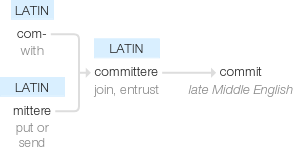Commit
late Middle English: from Latin committere ‘join, entrust’ (in medieval Latin ‘put into custody’), from com- ‘with’ + mittere ‘put or send’.
wiktionary
Borrowed from Latin committō(“to bring together, join, compare, commit (a wrong), incur, give in charge, etc.”), from com-(“together”) + mittō(“to send”). See mission.
etymonline
commit (v.)
late 14c., "to give in charge, entrust," from Latin committere "to unite, connect, combine; to bring together," from com "with, together" (see com-) + mittere "to release, let go; send, throw" (see mission).
The evolution of the modern range of meanings in English is not entirely clear. Sense of "to perpetrate (a crime), do, perform (especially something reprehensible)" was ancient in Latin; in English it is attested from mid-15c. Meaning "consign (someone) to custody (of prison, a mental institution, etc.) by official warrant" is from early 15c.
From 1530s as "trust (oneself) completely to;" from 1770 as "put or bring into danger by an irrevocable preliminary act." The intransitive use (in place of commit oneself) first recorded 1982, probably influenced by existentialism use (1948) of commitment to translate Sartre's engagement "emotional and moral engagement."
